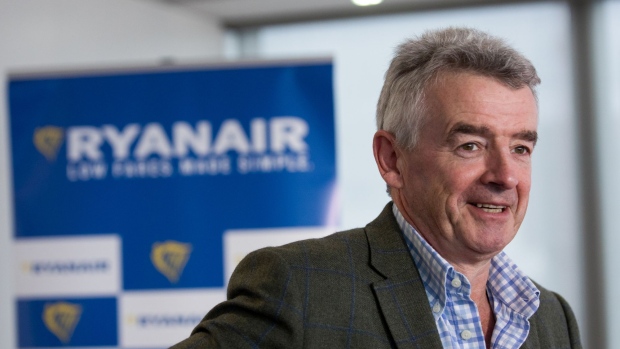Dec 1, 2022
Ryanair Cautious on First-Quarter Demand After Strong Christmas
, Bloomberg News

(Bloomberg) -- Ryanair Holdings Plc Chief Executive Officer Michael O’Leary struck a cautious note on bookings in the first quarter, when factors like inflation, economic contraction and higher energy prices may prompt travelers to curtail spending following strong Christmas demand.
“We expect it to be a little bit softer in the first quarter of next year, but then we think next summer is going to be very strong,” O’Leary told reporters in Dublin on Thursday. “Recession will be good for our growth but it will put pressure on our pricing.”
While there’s no expectation that bookings will dry up, and an anticipated slide in autumn sales failed to materialize, a dip seems likely in coming months as higher household bills begin to impact consumer spending, he said. Ryanair is currently 15% booked for the March quarter, compared with the usual 20%.
The comments from the CEO of Europe’s largest discount carrier underscore how even budget specialists like Ryanair or EasyJet Plc aren’t entirely immune to consumer concerns about the rising cost of living. While an economic slump tends to favor companies that provide rock-bottom pricing, there is growing evidence that some travelers are rethinking their plans by booking shorter trips -- both in duration and travel time -- or seeking out cheaper locations.
Encouraging trends include strong bookings for ski breaks and outbound leisure traffic from the UK amid a continuation of so-called revenge tourism as people make up for vacations lost during the Covid pandemic, O’Leary said. At the same time, the Easter holiday falls outside the first three months of 2023 and into Ryanair’s next fiscal year, which will weaken traffic for the quarter.
Summer Optimism
EasyJet said earlier this week that enduring demand for discounted flights should allow it to return to pre-pandemic levels of capacity by next summer, even as soaring inflation weighs on household incomes.
O’Leary said that while the summer season is looking robust, growth might be slightly hampered by Boeing Co.’s inability to delivery the agreed number of aircraft needed by then. Ryanair might be short of as many as 11 737 Max-8 200 models by the middle of June, which could reduce passenger projections for the year ending March 2024 to 182 million from 185 million, he said.
For the time being, Ryanair has limited visibility into next year, partly because people remain cautious about committing to travel, stung by several years of pandemic upheaval that sabotaged their plans.
Then there’s the risk of another coronavirus variant or a dramatic escalation of the war in Ukraine that would mean any outlook would have to be “thrown out of the window,” O’Leary said.
“There are lots of things to be worried about out there,” he said.
©2022 Bloomberg L.P.


